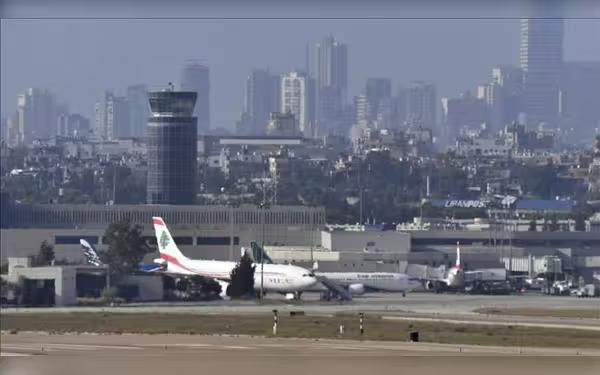Saturday, November 16, 2024 09:33 PM
Israeli Army Threatens Iranian Plane at Beirut Airport
- Israeli army hacks Beirut Airport control tower.
- Iranian civilian plane threatened by Israeli forces.
- Lebanon denies military use of Beirut International Airport.
 Image Credits: nation_pk
Image Credits: nation_pkIsraeli army hacks into Beirut Airport control tower, threatening an Iranian civilian plane amid rising tensions with Hezbollah.
The ongoing tensions in the Middle East have escalated dramatically, particularly between Israel and Hezbollah, a militant group based in Lebanon. Recently, the situation took a concerning turn when the Israeli army reportedly hacked into the control tower of Beirut's Rafic Hariri International Airport. This incident occurred on a Saturday and involved threats directed at an Iranian civilian aircraft that was attempting to land at the airport.
According to official sources, the Lebanese Ministry of Transport reacted swiftly to the Israeli threats. They instructed airport authorities to prevent the Iranian plane from entering Lebanese airspace. This directive was confirmed by sources within the ministry, who stated that it was a direct response to the aggressive posturing of the Israeli army. As of now, there has been no official comment from the Israeli side regarding these reports.
Earlier in the day, Israeli army spokesman Daniel Hagari made a strong statement, asserting that the army "will not allow any weapons to be transferred to Hezbollah," specifically mentioning that this includes any transfers through Beirut International Airport. He emphasized, "We will not allow the transfer of weapons to Hezbollah in any form. We are aware of Iranian weapons transfers to Hezbollah, and we will work to thwart them." This declaration underscores the Israeli army's commitment to preventing any perceived threats from reaching Hezbollah.
In response to these claims, Lebanese Minister of Public Works and Transport, Ali Hamieh, firmly denied that Beirut International Airport was being used for military purposes. He stated that the airport is "exclusively civilian," and any military air traffic would require the approval of the Lebanese army. This assertion highlights the ongoing struggle for control and the complexities of military and civilian operations in the region.
The situation further intensified when the Israeli army claimed responsibility for the "liquidation" of Hezbollah leader Hassan Nasrallah during an airstrike in Beirut’s southern suburb. Israeli spokesman Avichay Adraee stated that Nasrallah was targeted in an operation aimed at Hezbollah's central command, which is reportedly located beneath a residential building. This claim adds another layer of tension to the already fraught relationship between Israel and Hezbollah.
Since the onset of Israel's military actions in the Gaza Strip, which have resulted in a tragic loss of life, including nearly 41,600 victims, predominantly women and children, the conflict has only deepened. The cross-border warfare between Hezbollah and Israel has become increasingly complex, with both sides engaging in a dangerous game of military posturing.
As the situation continues to unfold, it is crucial for the international community to pay close attention. The potential for further escalation remains high, and the implications of these actions could have far-reaching consequences not only for the region but for global peace and security. Understanding the dynamics at play is essential for anyone looking to grasp the complexities of Middle Eastern politics and the ongoing conflict that has persisted for decades.













